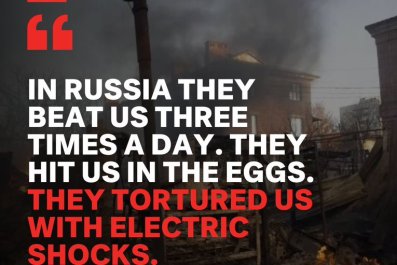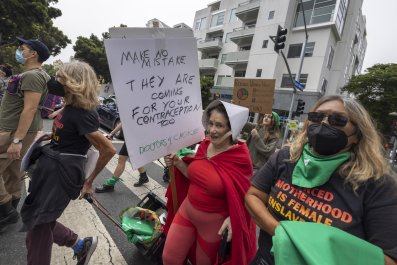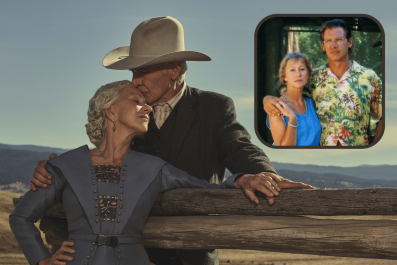The silence is the worst. When my twin brother, Paul Whelan, doesn't call us from the Russian labor colony where he is held hostage, we worry. Well, we worry all the time. But particularly when he's silent.
Paul calls home almost every day. When he doesn't, it usually means the routine human rights abuses have become something else. We already know that Paul is woken every two hours every night. Imagine not being able to sleep for more than two hours at a time for two years. We also know he's been put in solitary confinement for 30 days at a time. The U.N. describes that as torture.
Paul's calls to our parents are such a lifeline. I have not spoken to Paul since October 2018 when we were at our parents' house in Michigan. He was saying he'd be away to help a fellow Marine having a wedding in Moscow over Christmas. I was to keep an eye on our parents. We never imagined that he was the one who'd need an eye kept on him.

The calls stopped coming in September 2022 and again this past November. Paul tells our parents it is because the Wagner mercenaries are at the prison recruiting soldiers for Russia's war in Ukraine. The prison doesn't want Paul to report on the recruitment. They silence him by sending him to a prison hospital, where he's at risk of actually getting sick. Paul warned the prison that a lack of phone calls would worry our family, especially at Thanksgiving. We were glad when he finally resurfaced, healthy as you can be in a Russian prison. Back to the routine abuses and corruption of his day-to-day existence.
When there is silence, we think of the worst that can happen. We also wonder if the best might be happening. You can't know. If he isn't calling, does that mean he's being released? We haven't experienced that yet. When Brittney Griner came home, Paul's calls to our parents continued without interruption.
I was glad because we wanted Paul to hear the news from us. He learned of Trevor Reed's freedom—and his own continued imprisonment—on Russian TV. No one should learn news like that from the media. This time, the U.S. Embassy called Paul first. It seems Paul experienced the same range of emotions as I did; bitter disappointment for Paul, joy for Brittney and her family, rage at the Kremlin—the hostage takers who prolong this injustice.
Just as quickly as the news broke, we went back to work. Each member of our family lives a parallel life. There is the person who goes to work each morning, has coffee with the neighbors, tends the garden, or walks the dog. Then there is the other person. Our parents wait by a phone every day at 1 p.m., hoping for a call. They hear about Paul's needs and prison life. They share a rosy picture of local events in their village in Michigan and Flora the dog's latest antics. Small details of home can mean so much when you're in prison. I yearn for the day when their calls return to being a normal, spur-of-the-moment chat, just because you're thinking of someone.

In my case, I step into being the media person who works to bring Paul's story to the public and to try to hold the government accountable. Our sister, a professional portrait painter, is Paul's lead government relations advocate. Elizabeth was in touch with White House officials regularly in the days after Brittney's freedom. Her work never ceases. If she's not speaking to someone at the State Department, she's calling a member of Congress's staff to get or share information. None of us can stop until Paul is free.
For years, the White House was also silent. More recently, they have advocated vocally for Paul. But realistically, it may still be months or years before Paul is freed. We at least have some tangible evidence that the U.S. government is working on Paul's case. Many American families whose loved ones are wrongfully detained around the world may not have that.
I know their names—Siamak Namazi, Kai Li, Austin Tice, Paul Rusesabagina, Emad Shargi, Majd Kamalmaz, and so many more—and I feel for their families. I worry that they are going through the same challenges finding resources and advocates that we did. Who is asking about their loved ones at White House briefings? Who is helping to support them in prison, with a card or a donation?
We break our silence when we feel Paul needs an advocate or when the U.S. or Russian government needs to be held accountable. It has taken the U.S. government years to get to the point where they are actually taking steps to secure Paul's freedom. You can break yourself to pieces trying to get your loved one home, persuading your government to act. Once they are engaged, you wait. The hostage taker has a say in this too.
We do what we can and do not waste resources on things we cannot impact. We try to make sure Paul has money on his prison phone card and can call home. We send money so he can supplement the meager food—what Paul describes as two inches of fish a day—with food from the prison shop. We field his requests for food and medicine and work with the U.S., U.K., Canada, and Irish embassies to make sure it reaches him. Some does, and some is stolen by guards before Paul gets it.
This became much harder with the Russian war in Ukraine. How do you buy fresh fruits and vegetables in Russia without a Russian bank account? Paul doesn't get fresh food at the prison and now we can no longer wire money to the grocer. How do you get mail to Paul? The war means that postal services don't deliver mail sent to Russia. A journalist once asked me what financial support "the government" gave us to support Paul. I laughed, incredulous. None.

Unless you experience this, you may not appreciate the importance of the individual: The U.S. consular officer who shops for Paul and then mails things to him. The journalist who asks a question of a State Department official. The Marine who served with Paul in Iraq and sends us a note to pass to him. The person I've never met who says they sent Paul a card and has our family in their prayers. Paul's personal strength and will to overcome everything that the Russian government throws at him. I pray that Paul remains indomitable.
I felt so hopeless after Brittney's release that I had to look up the word "hope." That's what you do when you're a librarian! I grabbed onto that thread because hope is for a desired future outcome. So long as Paul isn't free, I will hope that he will be.
And when Paul comes home, I imagine I'll say, "Long time, no see," in the hopes of being rewarded with that big grin of his that I have missed. And I hope Paul just says, "Whatever." I'd welcome the silence then.
David Whelan is a law librarian who lives in California. He is campaigning for the release of his brother Paul Whelan, a former U.S. Marine detained in Russia since 2018.
All views expressed in this article are the author's own.
Do you have a unique experience or personal story to share? Email the My Turn team at myturn@newsweek.com










